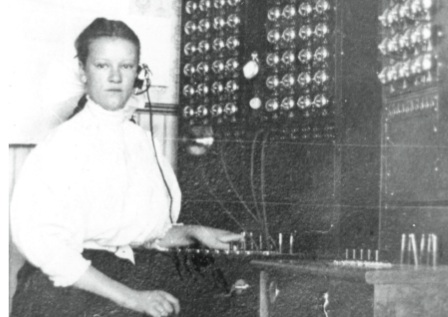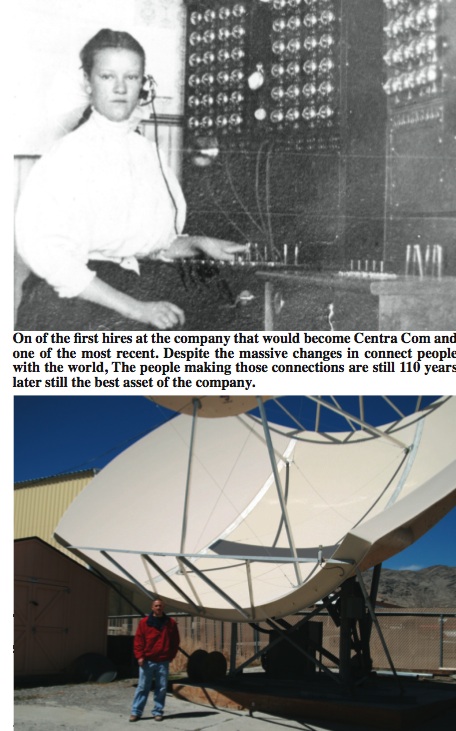In the early 1900’s, Mountain States Telephone and Telegraph Company installed the first telephone service in Sanpete County by bringing telephone lines into Mt. Pleasant, Utah. But the company refused to extend service just six more miles to reach the town of Fairview. Ezekial Cheney, Elsberry Garlic and Oscar Norman decided to remedy this problem by establishing Utah’s first independent rural telephone company.
On July 4, 1903, their partnership, called Fairview Telephone Company, received a franchise to construct a local telephone system in Fairview. At the time, the novelty of telephone service was only affordable by the more wealthy citizens. In their first year, Fairview Telephone Company only sold and installed a total of four telephones.
The following year the company joined forces with the new electric light company and jointly constructed telephone and electric light lines in the community. by the end of 1904, a number of new telephones had been installed in homes and businesses.
After several changes in ownership in ensuing years, Roy B. Cox purchased the entire telephone system on July 1, 1919. The business remained in the Cox family from that day forward.
During the 1920’s and 30’s, many men who lived in Fairview worked miles away in coal mines located at Scofield and Clear Creek, Utah. These miners would be away from their families for months at a time. Back then, long distance calls were charged by the length of wire the signal had to travel. Calls from Scofield were routed through Salt Lake City. Even though the men were only about thirty miles away, calls were so expensive most couldn’t afford to call home.
 Roy solved this problem by building a line directly over the mountains. Using a Model “T” Ford pickup truck and horses, he strung a line on trees wherever he could, and used poles through the clearings. The Model “T” was the company’s only installation vehicle at the time. When the arduous task was done, husbands and fathers from Sanpete Valley could affordably communicate on a regular basis with their families back home. Roy’s actions set a precedent for the way long distance calls are billed that survives to this day.
Roy solved this problem by building a line directly over the mountains. Using a Model “T” Ford pickup truck and horses, he strung a line on trees wherever he could, and used poles through the clearings. The Model “T” was the company’s only installation vehicle at the time. When the arduous task was done, husbands and fathers from Sanpete Valley could affordably communicate on a regular basis with their families back home. Roy’s actions set a precedent for the way long distance calls are billed that survives to this day.
The business was always a family project. Different members of the family would take turns operating the magneto switchboard, installing the old crank-type magneto phones, or helping construct new open-wire telephone lines.
In the winter of 1939, a tragic accident befell the Cox family that very nearly altered the succession of the company. Roy’s son, Iven, was trying to restore service following a disastrous snow storm. Unbeknownst to him, a high-voltage power line had fallen and come in contact with the bare telephone wires. As Iven tried to unravel the telephone wires he came into contact with the high-voltage and was very nearly killed. After a long hospital fight he miraculously survived the electrocution, but the accident left him without his right arm and took off two of the fingers on his left hand.
Undaunted by the results of the accident, and refusing to consider himself handicapped, Iven took over management of the business from brother-in-law, Bernal Harvey, in 1940. He operated the company continuously until his retirement in 1979.
But perhaps the greatest contribution Iven made to the benefit of the company was teaching his son, Branch, the telephone business. Branch’s “education “ started when he was a young lad just old enough to accompany his father on service calls and construction projects and culminated in his appointment to run the company after Iven retired in 1979.

The demands of running the construction and technical side of the business made it difficult for Branch to effectively deal with the day-to-day paperwork and minutia of running the business office. One of his first acts was to retain the services of his cousin, Eddie L. Cox, to deal with that side of the business. It was one of the most far-sighted and fortuitous decisions Branch ever made. The different but highly compatible strengths of the two men would prove to be the catalyst that in just two decades would catapult the company from being just another tiny, one-horse rural telephone company to the very top of the rural telco industry in the region.
At the time Branch took over, the company only had three employees; Branch, Eddie, and Mike Bringhurst. Mike did service calls and helped Branch with construction projects.
Branch and Eddie immediately began to modernize and expand the company’s operations. While Branch set about improving the outside plant, Eddie went to work modernizing the business office. By 1983 the company had installed its first computer system and was performing its own internal billing service. For the first time in its history, the phone company was getting its bills out on time.

Just when things appeared to be going smoothly, disaster struck. On April 14th, 1983, a massive landslide in Spanish Fork Canyon dammed a major waterway, buried the only highway leading through the canyon, and buried a major national east/west railway. In a matter of hours, the Thistle central office facility and all the phone lines leading through Spanish Fork Canyon were under ninety or more feet of water.
Working feverishly and against nearly impossible odds, Branch and Eddie located an operational new digital switch, transported it to Utah, built a new central office building, installed the new switch, rerouted and reconnected phone lines and had the whole system operational and back in service in only ten days time. Normal industry timetables for such a project were around one year. Their’s was a feat that netted the company considerable attention in the national telephone industry press.
In 1996, CentraCom became one of the first Utah rural telcos to provide its own internet service. That business is now one of the largest providers of Internet access in the state of Utah.
After remaining in the Cox family for more than 90 years, CentraCom’s successful operations and good management caught the eye of LICT, a company based in Rye, New York. LICT specializes in the purchase of small, well-managed rural telecommunications companies. During the disastrous stock market reversals of 2001 in the telecommunications industry, LICT was one of the the few national firms whose operations remained very profitable.
“We’re still a family,” says company president, Branch Cox. “The difference is that now we’re a much larger, stronger, more healthy one with a significantly brighter future for our employees and for the communities we serve.”
 The largest expansion in the history of the company occurred with the purchase of the Precis Communications cable TV system in the Sevier and Sanpete Counties in 2005. This acquisition launched Cable TV service and expanded Internet service. This purchase included an extensive fiber optic network. Since the initial Precis Communications purchase, CentraCom purchased the Precis Communications system in West Wendover, NV. In 2010, CentraCom expanded into Juab County with the purchase of the Nephi, UT system from Comcast Inc. and the Fillmore and Delta systems in Millard County. With each acquisition, CentraCom has invested heavily in rebuilding the systems and enhancing the service in each area. In 2013, a new fiber optic line will be completed connecting Delta and Fillmore with large capacity IP bandwidth.
The largest expansion in the history of the company occurred with the purchase of the Precis Communications cable TV system in the Sevier and Sanpete Counties in 2005. This acquisition launched Cable TV service and expanded Internet service. This purchase included an extensive fiber optic network. Since the initial Precis Communications purchase, CentraCom purchased the Precis Communications system in West Wendover, NV. In 2010, CentraCom expanded into Juab County with the purchase of the Nephi, UT system from Comcast Inc. and the Fillmore and Delta systems in Millard County. With each acquisition, CentraCom has invested heavily in rebuilding the systems and enhancing the service in each area. In 2013, a new fiber optic line will be completed connecting Delta and Fillmore with large capacity IP bandwidth.
The future of communications is in the large capacity of fiber optic networks. CentraCom has been on the leading edge of fiber optic network expansion in the state of Utah. CentraCom has the second largest fiber optic network in the state with a network that reaches nearly every area in the state. CentraCom is the leading provider of high capacity Internet circuits. This expansive network is instrumental in connecting the rural areas of Utah and Nevada to a nation-wide network. The CentraCom fiber optic network is connecting nearly every school south of Salt Lake City, UT throughout its entire service area. Also, nearly every rural healthcare facilities in the CentraCom service area is increasing their ability to provide quality service with the high capacity connection on the CentraCom network provides. And soon, Millard county schools and healthcare facilities will be connected with instantaneous communications to the national network.

